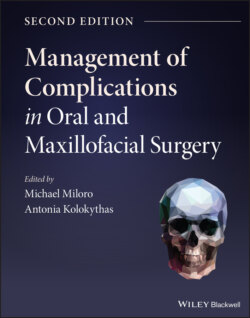Читать книгу Management of Complications in Oral and Maxillofacial Surgery - Группа авторов - Страница 68
TMJ Injury
ОглавлениеEtiology: excessive force, poor support of the mandible
Management: bite block use, avoid excessive mouth opening or force, arthrocentesis
The occurrence of temporomandibular joint (TMJ) injury as a result of third molar surgery is not supported in the literature. In a study by Threlfall et al., patients with diagnosed anterior disc displacement were no more likely than the control group to have had prior third molar surgery [24]. Also, only 9.5% of patients with anterior disc displacement reported third molar extractions within the last five years. Complaints of limited mouth opening are most often due to trauma from local anesthetic injections, inflammation of the muscles of mastication, and/or the body's own protective mechanism to limit function and further trauma [24].
Injury may occur if excessive force is used, a bite block is not in place when extracting lower third molars, or the patient's mouth is opened excessively [4, 24]. This transient injury often resolves with soft diet, moist heat, jaw rest, and NSAID use. An acutely “stuck disc” can be treated effectively with TMJ arthrocentesis when observed [24].
It is important to evaluate all patients undergoing third molar surgery for preoperative TMJ disease or myofascial pain, and thoroughly document any such history. TMJ clicks, pops, crepitus, opening and excursive movements, and any tenderness of the muscles of mastication should be noted. If prior TMJ dysfunction is present, contemplation for surgical extraction of teeth to avoid trauma to the TMJ should be considered.
